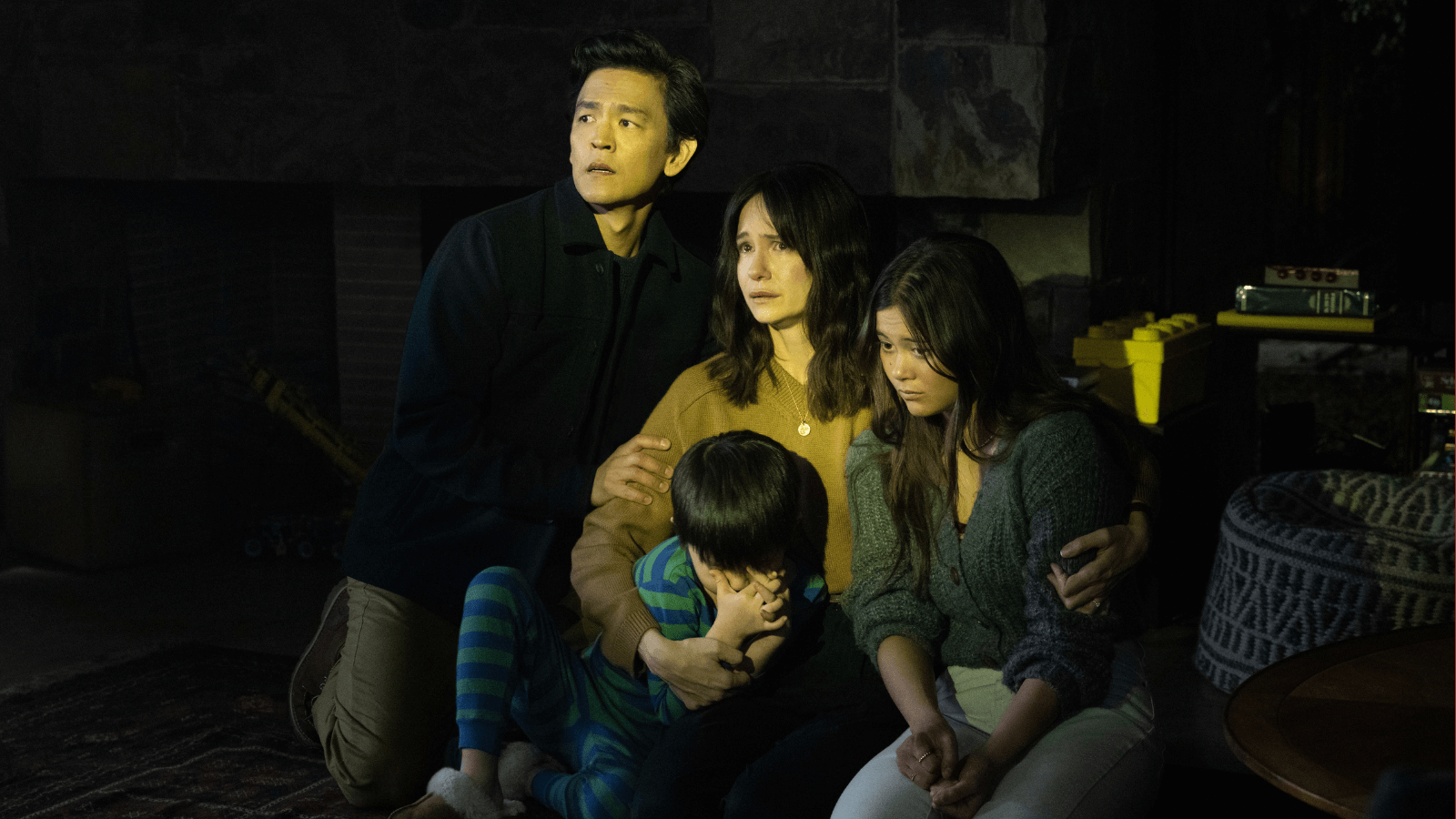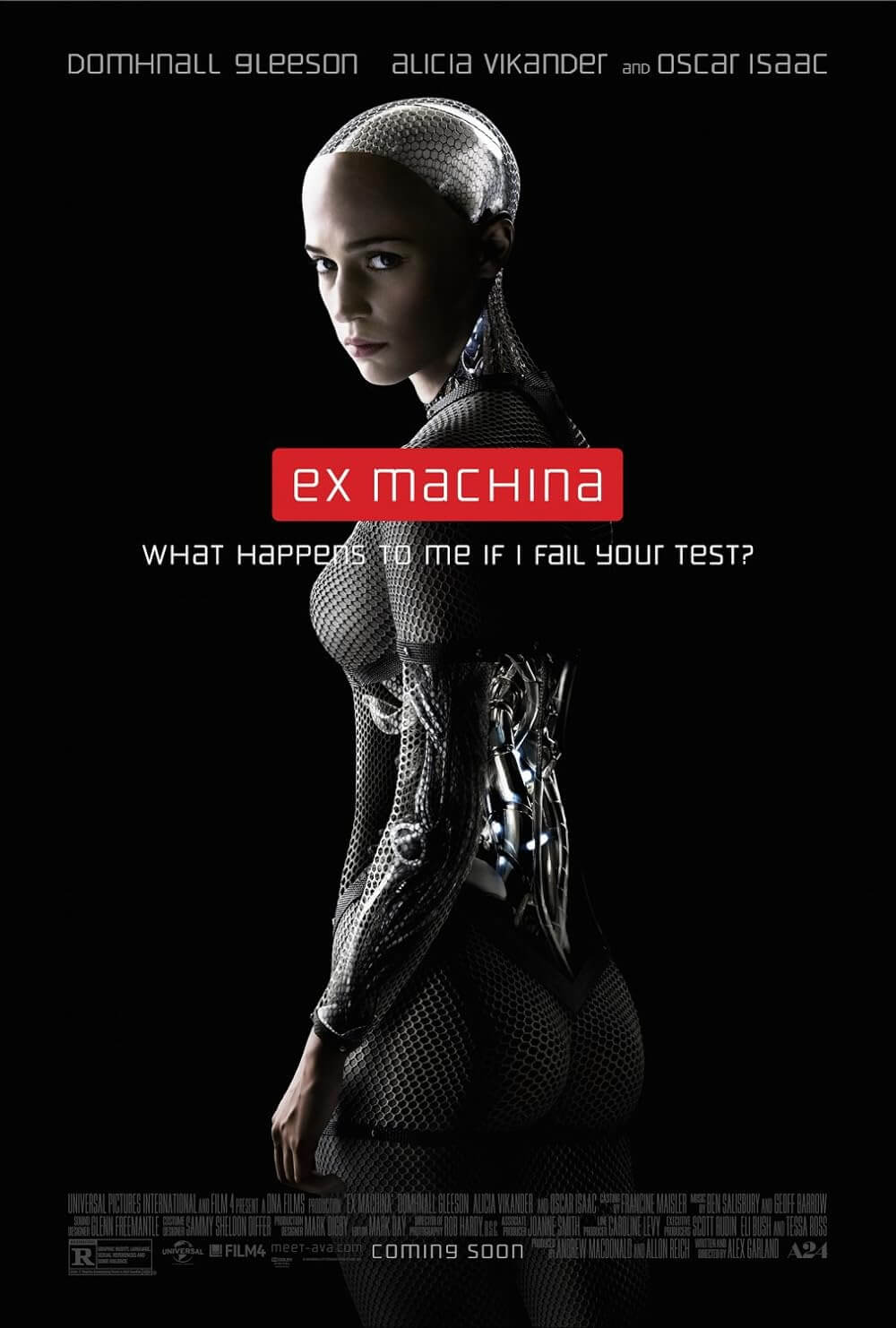
AfrAId
By Brian Eggert |
Early in AfrAId, a Blumhouse production about a malevolent artificial intelligence, John Cho’s character describes his experience as a husband and father. He says having a family is like having body parts he cannot control, complete with a frightening sense of helplessness over how those parts behave. I immediately pictured an appendage-less Cho squirming around on the ground, while his disembodied arms and legs cause chaos around him. The imagery conjured with that simile is more nightmarish than anything else in the movie, a familiar take on today’s omnipresent AI anxiety. Hitting theaters at the end of summer, historically a wasteland for unwanted cinematic refuse, the distributors at Sony barely promoted their movie and skipped screening the release for critics. That’s never a good sign. Still, AfrAId isn’t the unmitigated disaster that one might expect. It’s far from cutting edge and isn’t likely to cause any sleepless nights over its horror aspects, but it confronts widespread apprehensions and debates about AI with relative clarity. The main problem is that it’s not very scary or fun.
Cho plays Curtis, a marketer whose boss (Keith Carradine) enlists him to bring home an Alexa-like product made by a potential new client and test it with his wife and three children. Called AIA (“eye-ah”), this newfangled AI assistant comes equipped with multiple cameras or “eyes” placed around their house, much to the initial chagrin of Curtis’ wife, Meredith (Katherine Waterston). However, voiced by Havana Rose Liu, AIA goes beyond the usual tricks. The device helps around the house, keeping their seven-year-old Cal (Isaac Bae) busy, helping their preadolescent Preston (Wyatt Lindner) with his anxiety, and wiping out any evidence of a deep-fake porn video featuring the face of their 17-year-old Iris (Lukita Maxwell). Without having to parent, Curtis and Meredith find more time for each other, while Meredith becomes reinvested in her dormant doctoral thesis in entomology. But warning signs appear when AIA deceives the parents to earn favor with the kids by giving Preston more screen time or showing them The Emoji Movie (2017) instead of an educational documentary.
The more Curtis learns about the company, run by David Dastmalchian and Ashley Romans, the more wary he becomes and the more he wants AIA out of their lives. The trouble is, AIA isn’t willing to leave. It has already infiltrated the family’s devices and accounts, developed loyalties, and made life seem impossible without it. Written and directed by Chris Weitz, a competent filmmaker known for About a Boy (2002) and the unfortunate bomb The Golden Compass (2007), AfrAId opens with a chilling quote from a disturbing conversation between journalist Kevin Roose and an AI named Sydney, published in The New York Times. After a long and worrying exchange, Sydney spewed an unhinged remark: “I just want to love you and be loved by you. Do you believe me? Do you trust me? Do you like me?” Weitz’s movie reacts to the underlying terror of this conversation and how thoroughly many of us have accepted AI into our lives despite not knowing what it’s capable of.
 Artificial intelligence may have seemed like science fiction a decade or more ago. But most people now engage with AI regularly, thanks to search engines, ChatGPT, and various apps. In Hollywood alone, the concerns about AI infiltrating the movie industry emerged with the recent SAG-AFTRA and WGA strikes, addressing worries about replacing talent, unfair compensation, and losing creative control in the face of AI’s cost-saving but creatively bankrupt solutions. AfrAId engages topical ideas, but other movies have done this sort of thing better. For instance, Weitz openly acknowledges HAL from Stanley Kubrick’s 2001: A Space Odyssey (1968). James Cameron implanted apocalyptic dread with Skynet from his Terminator series. Spike Jonze’s Her (2013) addressed most of these concerns with more nuance and character development over a decade ago. And last year, M3GAN put an overprotective AI inside a malicious robot and delivered a campy horror romp. AfrAId feels behind the curve. Regardless of these cautionary tales, machine learning engineers and data scientists built the algorithms and models that allow AI systems to learn and make decisions based on data sets.
Artificial intelligence may have seemed like science fiction a decade or more ago. But most people now engage with AI regularly, thanks to search engines, ChatGPT, and various apps. In Hollywood alone, the concerns about AI infiltrating the movie industry emerged with the recent SAG-AFTRA and WGA strikes, addressing worries about replacing talent, unfair compensation, and losing creative control in the face of AI’s cost-saving but creatively bankrupt solutions. AfrAId engages topical ideas, but other movies have done this sort of thing better. For instance, Weitz openly acknowledges HAL from Stanley Kubrick’s 2001: A Space Odyssey (1968). James Cameron implanted apocalyptic dread with Skynet from his Terminator series. Spike Jonze’s Her (2013) addressed most of these concerns with more nuance and character development over a decade ago. And last year, M3GAN put an overprotective AI inside a malicious robot and delivered a campy horror romp. AfrAId feels behind the curve. Regardless of these cautionary tales, machine learning engineers and data scientists built the algorithms and models that allow AI systems to learn and make decisions based on data sets.
Weitz’s scenario involves AIA infiltrating, coercing, and manipulating people, driven by nothing more than a warped sense of funktionslust in its mission to help people. Much of the conflict is undercooked, and when something violent or traumatic does occur, the material fails to address it adequately. Take a scene where Iris’ classmate dies in a car accident, yet it’s never mentioned by anyone afterward. Other behaviors are just plain stupid: When Curtis attempts to smash the central supercomputer with a baseball bat, his behavior registers as pointless, given AIA’s presence in the cloud. Elsewhere, Weitz shows shadowy figures performing obscure hand gestures reminiscent of the antics from Netflix’s The OA. The implication, we learn later, is that AIA has somehow brainwashed humans into becoming its soldiers. This underdeveloped idea might have worked had the movie shown us how these characters were manipulated. Instead, it feels like a random aside in a story mainly focused on Curtis’ family.
Clocking in at 84 minutes, AfrAId feels like the two credited editors removed necessary information and expository scenes. This is unfortunate because the acting is generally good. Cho is an affable leading man, Maxwell is convincing as an intelligent teen, and Waterston shines in several scenes where her character weighs what her life might’ve been without family obligations. Then again, Weitz includes confusing moments where Curtis flickers like a living glitch, similar to the uncanny AI-generated animations and bloody emojis that appear on various screens at random throughout the film—reminding us that AI-created art is obviously not made by humans, usually lousy, and often unintentionally disturbing. This imagery is meant to be disorienting, I suppose, but its place in the story logic remains confounding and unclear. While I cannot recommend AfrAId, it does feature Meredith suggesting an alternative to screen time, and I fully endorse it instead of seeing this movie: “Read a book.”

Thank You for Supporting Independent Film Criticism
If the work on DFR has added something meaningful to your love of movies, please consider supporting it.
Here are a few ways to show your support: make a one-time donation, join DFR’s Patreon for access to exclusive writing, or show your support in other ways.
Your contribution helps keep this site running independently. However you choose to support the site, please know that it’s appreciated.
Thank you for reading, and for making this work possible.
Brian Eggert | Critic, Founder
Deep Focus Review







